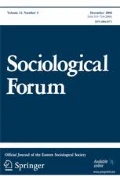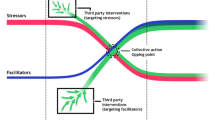Abstract
The study of social movements has recently been energized by an explosion of work that emphasizes “political opportunities”—a concept meant to come to grips with the complex environments that movements face. In the excitement over this new metaphor, there has been a tendency to stretch it to cover a wide variety of empirical phenomena and causal mechanisms. A strong structural bias is also apparent in the way that political opportunities are understood and in the selection of cases for study. Even those factors adduced to correct some of the problems of the political opportunity approach—such as “mobilizing structures” and “cultural framing”—are subject to the same structural distortions. We recommend social movement analysis that rejects invariant modeling, is wary of conceptual stretching, and recognizes the diverse ways that culture and agency, including emotions and strategizing, shape collective action.
Similar content being viewed by others
Author information
Authors and Affiliations
Corresponding author
Rights and permissions
About this article
Cite this article
Goodwin, J., Jasper, J.M. Caught in a Winding, Snarling Vine: The Structural Bias of Political Process Theory. Sociological Forum 14, 27–54 (1999). https://doi.org/10.1023/A:1021684610881
Issue Date:
DOI: https://doi.org/10.1023/A:1021684610881




